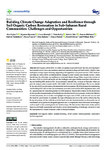Building Climate Change Adaptation and Resilience through Soil Organic Carbon Restoration in Sub-Saharan Rural Communities: Challenges and Opportunities
| dc.contributor.author | Taylor, A | |
| dc.contributor.author | Wynants, M | |
| dc.contributor.author | Munishi, L | |
| dc.contributor.author | Kelly, C | |
| dc.contributor.author | Mtei, K | |
| dc.contributor.author | Mkilema, F | |
| dc.contributor.author | Ndakidemi, P | |
| dc.contributor.author | Nasseri, M | |
| dc.contributor.author | Kalnins, A | |
| dc.contributor.author | Patrick, A | |
| dc.contributor.author | Gilvear, D | |
| dc.contributor.author | Blake, W | |
| dc.date.accessioned | 2021-11-04T13:51:56Z | |
| dc.date.available | 2021-11-04T13:51:56Z | |
| dc.date.issued | 2021-10-02 | |
| dc.identifier.issn | 2071-1050 | |
| dc.identifier.issn | 2071-1050 | |
| dc.identifier.other | ARTN 10966 | |
| dc.identifier.uri | http://hdl.handle.net/10026.1/18214 | |
| dc.description.abstract |
<jats:p>Soil organic carbon (SOC) is widely recognised as pivotal in soil function, exerting important controls on soil structure, moisture retention, nutrient cycling and biodiversity, which in turn underpins a range of provisioning, supporting and regulatory ecosystem services. SOC stocks in sub-Saharan Africa (SSA) are threatened by changes in land practice and climatic factors, which destabilises the soil system and resilience to continued climate change. Here, we provide a review of the role of SOC in overall soil health and the challenges and opportunities associated with maintaining and building SOC stocks in SSA. As an exemplar national case, we focus on Tanzania where we provide context under research for the “Jali Ardhi” (Care for the Land) Project. The review details (i) the role of SOC in soil systems; (ii) sustainable land management (SLM) techniques for maintaining and building SOC; (iii) barriers (environmental, economic and social) to SLM implementation; and (iv) opportunities for overcoming barriers to SLM adoption. We provide evidence for the importance of site-specific characterisation of the biophysicochemical and socio-economic context for effective climate adaptation. In particular, we highlight the importance of SOC pools for soil function and the need for practitioners to consider the type of biomass returns to the soil to achieve healthy, balanced systems. In line with the need for local-scale site characterisation we discuss the use of established survey protocols alongside opportunities to complement these with recent technologies, such as rapid in situ scanning tools and aerial surveys. We discuss how these tools can be used to improve soil health assessments and develop critical understanding of landscape connectivity and the management of shared resources under co-design strategies.</jats:p> | |
| dc.format.extent | 10966-10966 | |
| dc.language | en | |
| dc.language.iso | en | |
| dc.publisher | MDPI | |
| dc.subject | Soil organic carbon | |
| dc.subject | systems thinking | |
| dc.subject | whole system | |
| dc.subject | interdisciplinary | |
| dc.subject | sustainable land management | |
| dc.title | Building Climate Change Adaptation and Resilience through Soil Organic Carbon Restoration in Sub-Saharan Rural Communities: Challenges and Opportunities | |
| dc.type | journal-article | |
| dc.type | Review | |
| plymouth.author-url | https://www.webofscience.com/api/gateway?GWVersion=2&SrcApp=PARTNER_APP&SrcAuth=LinksAMR&KeyUT=WOS:000707778000001&DestLinkType=FullRecord&DestApp=ALL_WOS&UsrCustomerID=11bb513d99f797142bcfeffcc58ea008 | |
| plymouth.issue | 19 | |
| plymouth.volume | 13 | |
| plymouth.publication-status | Published online | |
| plymouth.journal | Sustainability | |
| dc.identifier.doi | 10.3390/su131910966 | |
| plymouth.organisational-group | /Plymouth | |
| plymouth.organisational-group | /Plymouth/Admin Group - REF | |
| plymouth.organisational-group | /Plymouth/Admin Group - REF/REF Admin Group - FoSE | |
| plymouth.organisational-group | /Plymouth/Faculty of Science and Engineering | |
| plymouth.organisational-group | /Plymouth/Faculty of Science and Engineering/School of Geography, Earth and Environmental Sciences | |
| plymouth.organisational-group | /Plymouth/REF 2021 Researchers by UoA | |
| plymouth.organisational-group | /Plymouth/REF 2021 Researchers by UoA/UoA14 Geography and Environmental Studies | |
| plymouth.organisational-group | /Plymouth/Research Groups | |
| plymouth.organisational-group | /Plymouth/Research Groups/Centre for Research in Environment and Society (CeRES) | |
| plymouth.organisational-group | /Plymouth/Research Groups/Centre for Research in Environment and Society (CeRES)/CeRES (Reporting) | |
| plymouth.organisational-group | /Plymouth/Research Groups/Marine Institute | |
| plymouth.organisational-group | /Plymouth/Users by role | |
| plymouth.organisational-group | /Plymouth/Users by role/Academics | |
| plymouth.organisational-group | /Plymouth/Users by role/Researchers in ResearchFish submission | |
| dcterms.dateAccepted | 2021-09-30 | |
| dc.rights.embargodate | 2021-11-5 | |
| dc.identifier.eissn | 2071-1050 | |
| dc.rights.embargoperiod | Not known | |
| rioxxterms.versionofrecord | 10.3390/su131910966 | |
| rioxxterms.licenseref.uri | http://www.rioxx.net/licenses/all-rights-reserved | |
| rioxxterms.licenseref.startdate | 2021-10-02 | |
| rioxxterms.type | Journal Article/Review | |
| plymouth.funder | "International". Jali Ardhi [Care for the Land] project: Realising land management change in degraded Maasai grazing lands.::NERC | |
| plymouth.funder | "International". Jali Ardhi [Care for the Land] project: Realising land management change in degraded Maasai grazing lands.::NERC | |
| plymouth.funder | "International". Jali Ardhi [Care for the Land] project: Realising land management change in degraded Maasai grazing lands.::NERC |


